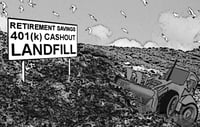 Following World War II, America saw the rise of a “throwaway” society – consuming, squandering and discarding vast quantities of national resources. Gradually, an awakening occurred as we realized that conservation was a more-sustainable path. Recycling models emerged, and once fully-adopted, they became deeply-ingrained in our psyches and formed a pillar of corporate social responsibility.
Following World War II, America saw the rise of a “throwaway” society – consuming, squandering and discarding vast quantities of national resources. Gradually, an awakening occurred as we realized that conservation was a more-sustainable path. Recycling models emerged, and once fully-adopted, they became deeply-ingrained in our psyches and formed a pillar of corporate social responsibility.
Today, a similar awakening is sorely-needed in America’s 401(k) system, where plan sponsors and service providers turn a blind eye to cashout leakage, the destruction of retirement savings that occurs after participants change jobs.
While 401(k) cashout leakage may not stink in our streets, its economic effects are deplorable. Each year, this slow-motion train wreck robs millions of Americans of their retirement security and converts their retirement savings into wasted consumption and avoidable tax penalties.
- In the first year following a job change, almost a third (32%) of terminated 401(k) participants will take the path-of-least-resistance and choose to cash out their retirement savings.
- At 7 years following a job change, this figure increases to 41%.
- As shown by the National Retirement Savings Cash Out Clock, 6 million 401(k) participants per year will prematurely cash out $68 billion in retirement savings.
The bulk of 401(k) cashout leakage results from a lack of plan-to-plan portability. Research has proven that only about one-third of cashout leakage is driven by true financial hardship and further establishes that making plan-to-plan consolidation the easiest choice for participants will prevent the majority of cashout leakage.
Solving the 401(k) cashout leakage problem would yield massive benefits to the American economy. In 2012, EBRI estimated the additional retirement savings that would result if cashout leakage was uniformly reduced across all balance segments and reported that the difference between current projections and a 50% reduction would yield an additional $1.3 trillion in savings. A subsequent analysis by EBRI in 2017 revealed that as much as $2 trillion could be retained in our retirement system if retirement savings portability were fully-implemented for all balances.
What Needs to Be Done?
While we know what causes 401(k) cashout leakage and how to prevent it, we’re not yet fully-committed to solve the problem. The solution is straightforward, but requires awareness, focus and collaboration amongst various parties.
Auto portability is the most critical step forward required to minimize 401(k) cashout leakage. Auto portability is the routine, standardized and automatic movement of an inactive participant’s small balance retirement account (less than $5,000) from a former employer’s retirement plan to an active account at a new employer’s retirement plan, when a participant changes jobs. Presently, these forced-out participants cash out at rates of 60% or higher. Those who don’t cash out are consigned to safe harbor IRA “landfills” where their balances are forgotten, depleted through annual fees or escheated to states. Plugging leakage for this balance segment alone would capture $1.5 trillion of the $2 trillion in savings estimated in the 2017 EBRI analysis.
First, the Department of Labor should issue the requested guidance on auto portability to provide the retirement industry the comfort needed to move forward with the adoption of auto portability. In fact, members of Congress have sent two separate letters (here and here) to the Department of Labor requesting just such guidance.
Second, industry collaboration must occur in order to fully adopt Auto Portability, which has already been implemented at a mega plan sponsor in the healthcare services industry. The good news is that the initial phases of this collaboration have already occurred, and with Department of Labor guidance in hand, this could quickly move forward.
Finally, and most importantly, plan sponsors should accept responsibility for reducing cashout leakage. In my view, reducing cashout leakage is a corporation’s social responsibility. Accordingly, any corporation that doesn’t seek to stem cashout leakage is shirking their responsibility to their employees and to our society, and not acting in the best interest of participants.
With awareness, focus and collaboration, the scourge of 401(k) cashout leakage will be significantly reduced, ensuring the retirement security of millions of Americans.
